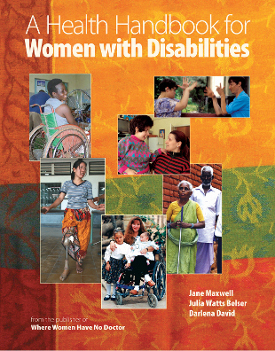National Public Health Week: Community Health Advocacy
From our partner Hesperian Health Guides:
The places where we eat, sleep, work and live greatly affect our health. Most of us have heard that access to nutritious foods, green spaces and clean air are all necessary conditions for a healthy community. When these basic needs are not met, we must organize for change. That’s why all Hesperian books provide practical strategies to mobilize your community alongside actionable health information.
For example, A Health Handbook for Women with Disabilities presents different ways for people to get involved in disability advocacy including:
- starting a literacy class for the women who cannot read or write
- sharing information about community services and working together to make them more accessible
- organizing social activities that help disabled girls come out of their homes and meet other people with disabilities and other young girls
One of the stories featured highlights how people with disabilities in Russia formed the Freedom of Movement Society. Together, they helped their city make buildings more accessible and created accessibility guidelines for architects designing new structures!
As National Public Health Week 2024 comes to a close, we invite you to explore our books for ways you can organize to improve health in places where you live and work. This might look like advocating for medical care and support for children affected by HIV or working to eliminate dangerous or discriminatory workplace practices. Check out our HealthWiki for more examples!
From Chapter 2 of Workers’ Guide to Health and Safety:
“Talking about all the causes of a problem helps workers find more ways to solve the problem and prevent it from happening again. Workers can talk about which causes are the most important, which causes they can change, and who might be their allies to help them change other causes. Different workers will ask different questions and come up with different answers. The questions and answers for your situation will grow out of your own conditions.
Group the answers to the “But why?” activity to make it easier to see the causes of Juanita’s problem. For example, group causes into “work conditions,” “social causes,” and “political and economic causes.” Create your own groups of causes.”

